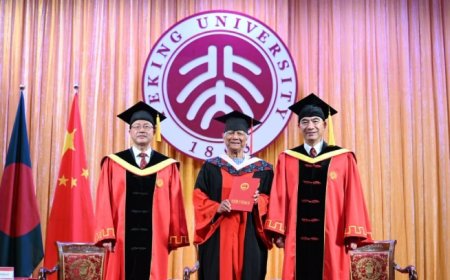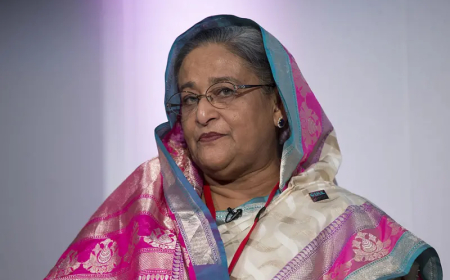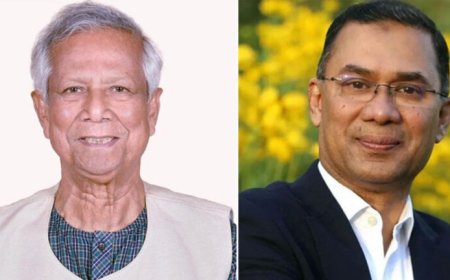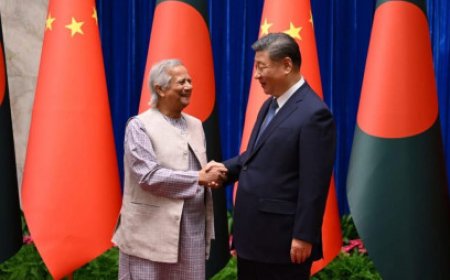Pakistan pulls closer to post-Hasina Bangladesh amid shared India concerns
Since Sheikh Hasina’s ouster, Pakistan and Bangladesh have edged closer as politics in both countries ride on a general anti-India sentiment.
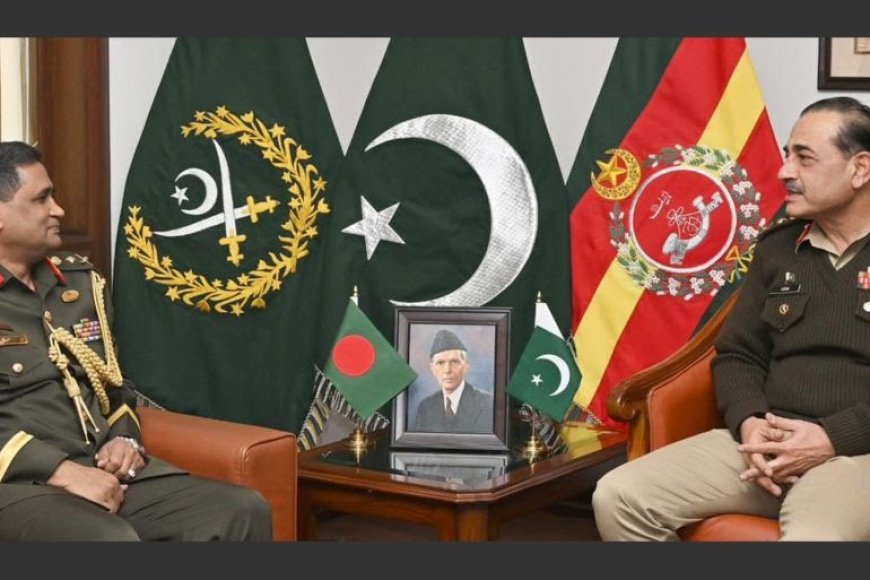
Pakistan pulls closer to post-Hasina Bangladesh amid shared India concerns
Since Sheikh Hasina’s ouster, Pakistan and Bangladesh have edged closer as politics in both countries ride on a general anti-India sentiment.
Pakistani army chief General Asim Munir (right) met Lieutenant General S M Kamrul Hassan, principal staff officer of the Bangladesh army this week in Rawalpindi. [Handout/Inter-Services Public Relations]
Pakistan's army chief, General Asim Munir, right, meets with Lieutenant General SM Kamrul Hassan, principal staff officer of the Bangladesh army, in Rawalpindi, Pakistan [Handout/Inter-Services Public Relations]
By Abid Hussain
Published On 17 Jan 2025
17 Jan 2025
Islamabad, Pakistan – The flags of their nations planted on a table between them, Pakistan’s army chief, General Asim Munir, sat with Lieutenant General SM Kamrul Hassan, an officer in the Bangladesh military.
It was the high point of Hassan’s trip to the Pakistani capital, where he also met other senior Pakistani military officials. Commenting on Tuesday’s meeting between Munir and Hassan, the Pakistani military’s media wing described the countries as “brotherly nations”.
That’s not how Dhaka and Islamabad have viewed their relationship for much of the 54 years since Bangladesh broke away from Pakistan, winning independence after one of the 20th century’s bloodiest wars.
Live
Sign up
Open the menu
News
|
Politics
Pakistan pulls closer to post-Hasina Bangladesh amid shared India concerns
Since Sheikh Hasina’s ouster, Pakistan and Bangladesh have edged closer as politics in both countries ride on a general anti-India sentiment.
Pakistani army chief General Asim Munir (right) met Lieutenant General S M Kamrul Hassan, principal staff officer of the Bangladesh army this week in Rawalpindi. [Handout/Inter-Services Public Relations]
Pakistan's army chief, General Asim Munir, right, meets with Lieutenant General SM Kamrul Hassan, principal staff officer of the Bangladesh army, in Rawalpindi, Pakistan [Handout/Inter-Services Public Relations]
By Abid Hussain
Published On 17 Jan 2025
17 Jan 2025
Islamabad, Pakistan – The flags of their nations planted on a table between them, Pakistan’s army chief, General Asim Munir, sat with Lieutenant General SM Kamrul Hassan, an officer in the Bangladesh military.
It was the high point of Hassan’s trip to the Pakistani capital, where he also met other senior Pakistani military officials. Commenting on Tuesday’s meeting between Munir and Hassan, the Pakistani military’s media wing described the countries as “brotherly nations”.
That’s not how Dhaka and Islamabad have viewed their relationship for much of the 54 years since Bangladesh broke away from Pakistan, winning independence after one of the 20th century’s bloodiest wars.
Pakistan watches with caution as old ally Taliban gets closer to India
Who were the Razakars and why are they central to Bangladesh protests
The tension in their ties only deepened during the nearly 16-year rule of Bangladeshi Prime Minister Sheikh Hasina, who was ousted from power in August after mass protests and forced to flee to neighbouring India, which backed her government.
But since Hasina’s departure, Pakistan and Bangladesh have edged closer to each other in an apparent reset at a time when politics in both countries have a general anti-India sentiment, overriding the historical animosity between Islamabad and Dhaka.
Munir and Hassan “underscored the importance of strengthening military ties and reaffirmed their commitment to insulating this partnership from any external disruptions”, the Pakistani military said. And their meeting was one in a series of high-level exchanges between the nations
